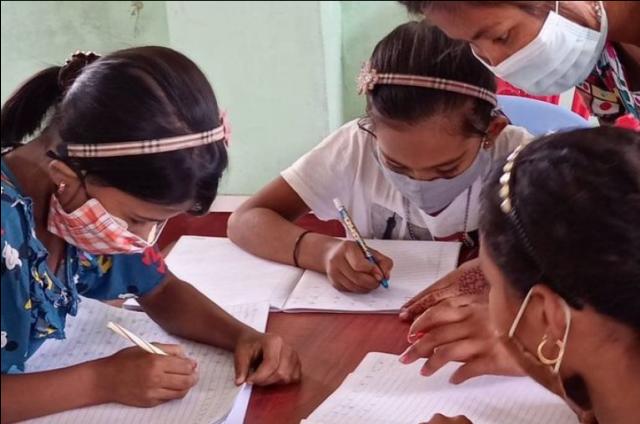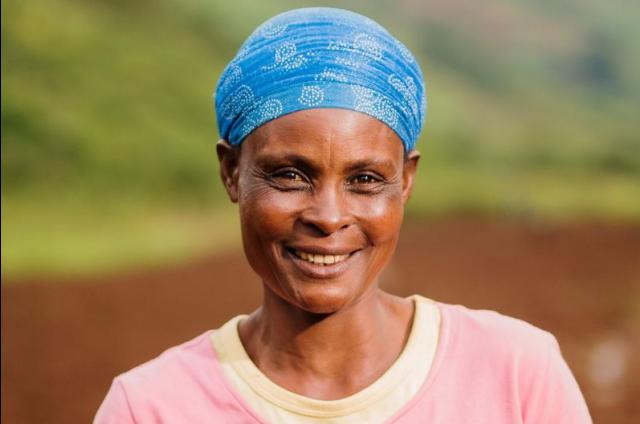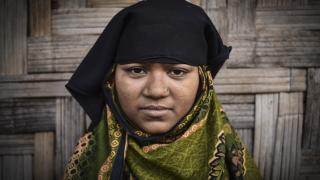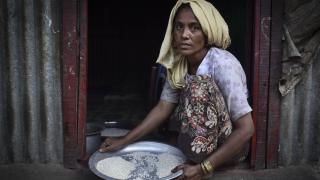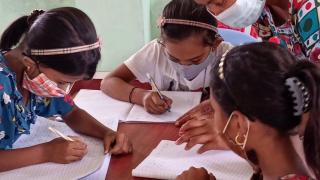Myanmar
CRISIS IN MYANMAR
A devastating earthquake has left entire communities destroyed
On 18th March 2025, a catastrophic 7.7-magnitude earthquake struck central Myanmar, causing unimaginable destruction. Entire communities were destroyed, thousands lost their lives or suffered severe injuries, and the healthcare system has been overwhelmed. The disaster unfolded against the backdrop of ongoing civil unrest, further hindering rescue and relief efforts.
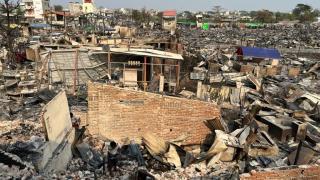
Our partners in Myanmar have rushed to provide life-saving aid to earthquake survivors. Your gift today could help deliver:
• Supplies of food and safe drinking water
• First aid kits, medical supplies and cash assistance for injured individuals
• Non-food items, including solar lights for rescue teams and fuel for machinery to aid in recovery efforts
What is happening in Myanmar?
In August 2017, a deadly crackdown by Myanmar's army on Rohingya Muslims forced hundreds of thousands to flee across the border into Bangladesh. The harrowing accounts of rape, murder and mutilation shocked the world. On 1st February 2021, the Myanmar military overthrew the democratically elected government, undoing a decade of progress and plunging the country into further chaos. As of 22nd March, 2022 the U.S. formally determined that the atrocities committed against the Rohingya people by Myanmar military forces are acts of genocide.
Throughout 2024, Myanmar experienced intense and widespread conflict, pushing the number of internally displaced people beyond 3.5 million. An estimated 19.9 million people - over a third of the population - require humanitarian assistance.
With widespread fighting consuming vast regions, nearly 15.2 million people face acute food insecurity, desperately seeking ways to feed themselves and their families. Education and health services are severely disrupted and on the brink of collapse, leaving millions of children without access to learning and medical care. Meanwhile, Myanmar remains one of the world’s most underfunded humanitarian crises, leaving millions without the urgent support they need.
As a result, the past four years have brought unprecedented challenges, creating a profound ‘polycrisis’. Political instability, entrenched conflict, economic turmoil, severe human rights violations and worsening environmental degradation have reshaped every aspect of life.
The Impact on Women and Girls
An estimated 9.7 million women and girls are in urgent humanitarian need due to the ‘polycrisis’. These fragile conditions significantly increase the risk of gender-based violence, with many survivors unable to access essential services, including medical and psychological support, or legal justice.
Rates of child marriage have soared in conflict-affected areas, increasing by 20% as families in crisis force young girls into early marriages for perceived protection and survival. Meanwhile, more and more children are being pulled out of school, further limiting their futures.
Women and girls with disabilities are even further marginalised, facing at least two to four times higher risk of violence than other women. With vital services crumbling, their access to support and protection is rapidly diminishing.
The ongoing crisis in Myanmar is deepening gender inequality and threatening the safety, health, and futures of millions of women and girls. Urgent action is needed to provide life-saving assistance and ensure they are not left behind.
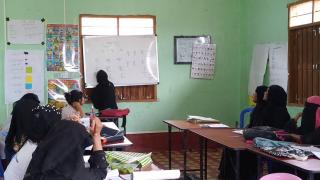
Meeting the Needs of Women Survivors in Myanmar:
Our Local Partner
Since 2021, we have been working with a locally registered partner, to support Rohingya women and adolescent girls in Northern Rakhine State. Through this partnership, we provide life skills, vocational training, and basic literacy and numeracy education to help women and girls build confidence and resilience.
We also support our partner in delivering joint classes for men and women, particularly family members of the adolescent girls enrolled, as a means to shift deeply entrenched views of women’s roles and participation. These sessions incorporate elements of Women for Women International’s Men’s Engagement Programme (MEP) curriculum, which we licensed to our partner to develop their own Adult Engagement Programme.
Additionally, our partnership provides teacher training, capacity strengthening, and financial support to local community teachers, along with educational materials for both male and female students.
Bringing Hope Through Education
Supporting Rohingya Refugee Children
In the refugee camps of Cox’s Bazar, Bangladesh, education is a beacon of hope for Rohingya children who have endured displacement and hardship. Yet, without essential school supplies, many struggle to access learning opportunities. Recognising this urgent need, Women for Women International, in collaboration with our partner, worked to procure and distribute vital educational materials to six community-based organisation (CBO) run schools, ensuring that refugee children can continue their education.
In the camp, resources are scarce. There were many times when I had to make do with what little I had - sometimes borrowing books or using old notebooks - but it was never enough to fully reach my potential.
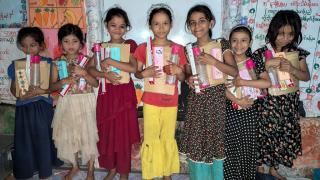
In October and early November 2024, our local partner distributed educational supplies for Rohingya students through six CBOs partners; New Life, Bright Life, Rohingya Women Association for Education & Development (RWAED), Youths for Rohingya Development (YRD), Rohingya Advancement Committee (RAC) and Nurture Aid Initiative for Rohingya (NAIR). A remarkable 2,253 children received materials, with 36% of them being girls surpassing the initial goal for female students.
Every notebook and every pen represents a reminder that education remains a powerful tool for change - even in the most challenging circumstances. Together, we are helping Rohingya children reclaim their right to learn and equipping them with the knowledge to shape a better future.
Living in Camp 5, E-2, hasn’t always been easy, but it has taught me resilience…I know that success doesn’t come overnight, but with dedication, I can accomplish anything.
Amplifying Women’s Voices
Women affected by conflict often go unheard in decisions that shape their futures. At Women for Women International, we believe their voices must be at the heart of solutions.
That’s why, as part of our global consultation project “Amplifying the Voices of Women Survivors of War”, we worked with our local partner to gather critical data from women in Myanmar and Rohingya refugee camps in Cox’s Bazar, Bangladesh. Their experiences and insights have contributed to our global advocacy efforts, culminating in the presentation of key findings at the 79th session of the UN General Assembly in September 2024.
In August 2024, Women for Women International and our local partner conducted 228 Key Informant Interviews (KIIs) and 29 Focus Group Discussions (FGDs) across conflict-affected regions.
In total, we reached 228 women through individual surveys in Myanmar and 268 women through FGDs, surpassing our original target and ensuring that more women had the opportunity to share their perspectives.
The collected data was submitted to our team for in-depth analysis on 14th August, 2024, feeding into the ‘#SheDares. Will You?’ campaign and the global consultation report, “From Asking to Action”, presented at the UN General Assembly in September 2024. Some key findings from this report include:
- 81% of the women consulted are hopeful and expectant that their circumstances will improve in the next 5 years.
- Only 27% of the women said they always feel safe participating in community activities.
- 96% of the women reported violence impacting women in their communities.
- 71% of the women recognised the key role that women have to play in both conflict prevention and response.
- Only 25% of the women we spoke to reported having received some form of relief and recovery assistance.
By ensuring that the voices of women survivors of war are heard at the highest levels, we are not just listening - we are driving action for change. That is the power of women, for women.
Read more
Conflict Response Fund
subtitle: In 2018, we launched a new conflict response fund — a separate funding pool to more rapidly help women who are caught in the current horrors of our time. To reach women in their most critical moments, we work with partners who can respond to conflict and
In 2018, we launched a new conflict response fund — a separate funding pool to more rapidly help women who are caught in the current horrors of our time. To reach women in their most critical moments, we work with partners who can respond to conflict and make an immediate impact.
Since August 2017, Myanmar has forced over 700,000 Rohingya refugees, mostly women and children, into makeshift communities at the border of neighbouring Bangladesh. Our Conflict Response Fund, launched in May 2019, is helping Rohingya women to regain stability for themselves and their families.
Through the Conflict Response Fund, we are embarking on a mission to reach women and adolescent girls in Northern Rakhine State, Myanmar. Learn more about our project objectives and how you can offer your support.

